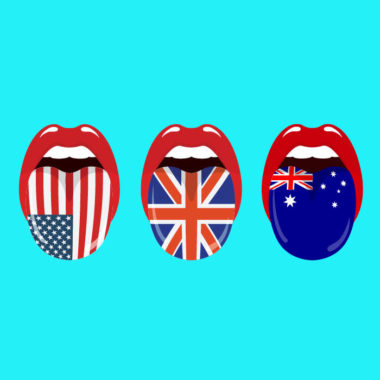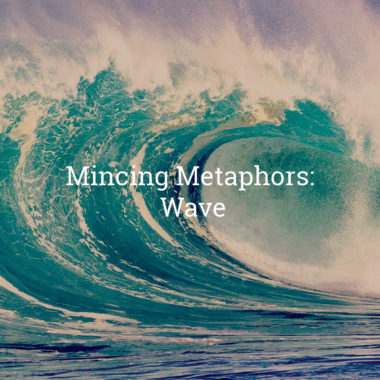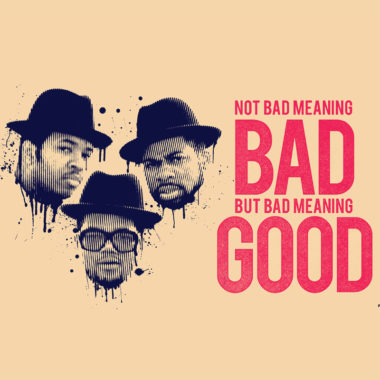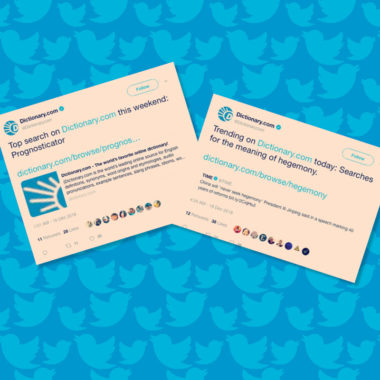Archives
-
Naughty Words Kids Use Before They Learn Their Meanings
Stop us when this starts to sound familiar. You’re chatting away, having a great conversation, and then everyone seems to stop in their tracks. Did they just notice a giant chunk of basil in your front teeth? Catch a whiff of those garlic knots you had with lunch? Or, was it something about that word you used that has your friends’ shoulders shaking and their …
-
Why Are We Calling Everything A “Wave”?
by Taneesh KheraWhen you picture a wave, what do you think of? I bet you see a body of water, possibly a lake, but more likely an ocean. A shore might come to mind, as would sand and beaches, and maybe a surfer or a boat or ship. Another possibility, not altogether different, is a hand saying hello, waving goodbye. If you consume much news, …
-
Not All Bad: 7 Ways “Bad” Can Be Good
The word bad is well, just that. Its original meaning is still the most common one in use today: “not good in any manner or degree.” But, come on, we all know bad isn’t always a bad thing … in fact, using bad as a word of approval started in the 1890s and was popularized in the 1920s within the jazz scene. There’s even a quote …
-
How Our Greatest Strengths Become Weaknesses
Here are the best good-and-evil duos that we all struggle to keep balanced, you may even learn an antonym or two along the way.
-
The Oldest Abbreviations In English
In the age of LOL, WTF, and OMG, abbreviations are often looked at as a sign of the coming apocalypse. (Spoiler: LOL, WTF, and OMG are not the oldest abbreviations in English—you’re shocked, we know.) So-called textspeak is viewed as a lesser form of English, and many people worry that pretty soon we’ll all be communicating solely in emoji. But, abbreviations aren’t exactly a new invention. …
-
Humanitarian, Sublimate, And Other Trending Words On Dictionary.com
From Glenn Close at the Golden Globes to Cyntoia Brown in Tennessee, here’s who (and what) had folks searching for meaning on Dictionary.com the week of January 4–11, 2019. Humanitarian President Donald Trump made his first-ever address to the nation from the Oval Office this week, so it’s no surprise that folks tuned in to see what he had to say, or that plenty stuck …
-
Ultima Thule, Bandersnatch, And Other Trending Words On Dictionary.com
Thanks to the holidays, we’re serving up two weeks worth of words that have trended on Dictionary.com! From Santa Claus to outer space, here’s what had folks searching for meaning December 21, 2018–January 4, 2019. Ultima Thule Space fans spent the week watching as NASA’s New Horizons spacecraft flew by the most distant space object ever explored. Dubbed Ultima Thule, the object is some 4 billion miles …
-
Prognosticator, Herpetologist, And Other Trending Words On Dictionary.com
Do you have your eyes on the news? Here are the words that made headlines and drove searches December 14–21, 2018 on Dictionary.com! Prognosticator The word prognosticator tends to get its biggest use in February, when a groundhog is hauled out to forecast the arrival of spring. But the noun, which means “one who forecasts or predicts (something future) from present indications or signs,” jumped onto …
-
The Surprisingly Religious Background Of “Golly,” “Gosh,” And “Gee”
Gosh, golly, and gee casually express surprise or excitement, right? Well, yes, but when they were first introduced to the English language, these short words had a much more serious origin and purpose. Where did golly, gosh, and gee come from? While this folksy trio are informal interjections, they are also euphemistic alterations of the word God or, in the case of gee, Jesus. Of the three, gosh is recorded …
-
Do You Give Presents Or Gifts? Here’s The Difference
Where do the words gift and present come from? Why does English use both? We’re pretty sure it’s not just so that children can ask for toys in multiple ways … Language is not a linear, predestined development. Even though it may feel as if the language we speak is in some way the logical conclusion of thousands of years of development, every word that …











